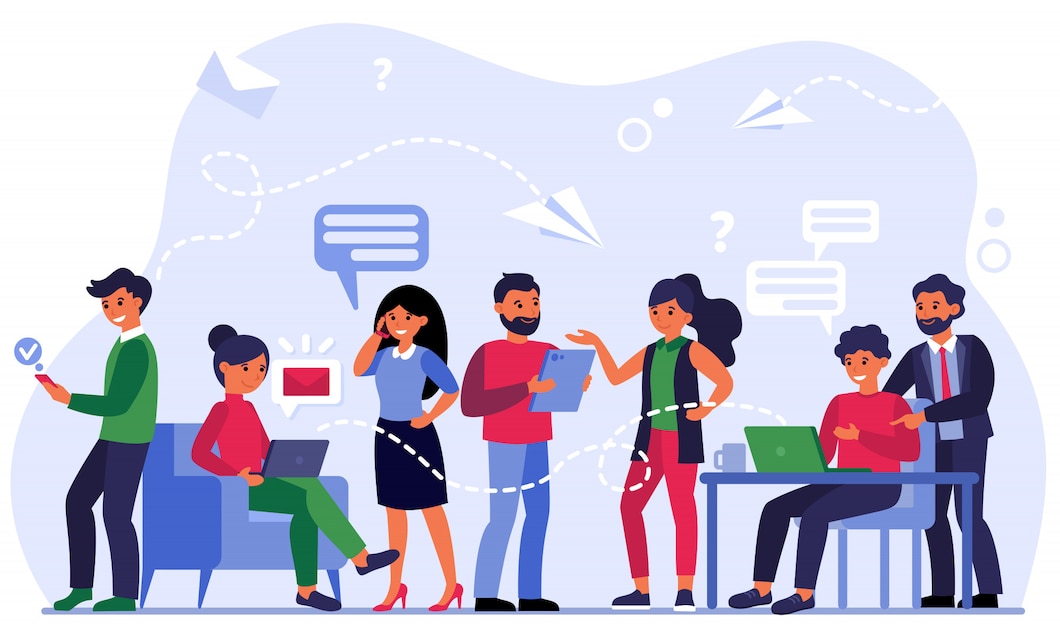5 Methods To Enhance Your Corporate Communication Expertise
Communication involves sharing knowledge with others, either verbally or in writing. Developing more robust corporate communications can positively impact productivity and career growth.
We are all well aware that effective communication is crucial for professional success. Our ability to communicate effectively may win the hearts of our colleagues, impress our superiors, and earn us the respect of our subordinates. The question now becomes how to hone these skills to their fullest potential.
The top 5 strategies for enhancing your professional communication

Ace your digital interactions
Communication via digital means is now more casual and informal than ever due to the widespread use of slang and emoticons. However, taking digital communication as seriously as any other communication would be best.
Write all company emails and instant communications as though anyone could read them. Always use tact and judgment when conversing with others. Avoid employing slang or colloquialisms that not everyone will understand or value. It is best to use simple language to avoid misunderstandings or unwarranted provocation. In addition, it will show that you are competent and severe.
Enhance your business vocabulary.
Some of the most influential business communicators maintain an industry-specific lexicon of terms. No matter how intricate or sophisticated their concept may be, they may articulate it using these terms and phrases.
Enrolling in a software-based business language training program can quickly increase your specialized vocabulary. Reading books, periodicals, and dictionaries written specifically for your field is also helpful. Browse related company websites to your field to learn the language without spending a dime.
Be mindful of how you spend your free time.
Maybe this was the last thing you expected to see on the list. What do the shows you like to watch, the books you want to read, and the activities you enjoy doing have to do with effective business communication? There are two parts to the response. First, they may help you increase your business savvy by introducing you to fresh ideas and relevant news.
A person who spends their free time watching reality TV is unlikely to be as conversant in business topics as someone who reads business publications and connects with successful individuals. Second, engaging in more intellectual hobbies during your free time will provide far more rewarding ideas and insights than watching or reading less beneficial things.
Indulge in the most effective collaboration tools.
If email and social media are your primary means of contact, you may be inundated with irrelevant and repetitive messages and miss out on the most vital exchanges. Utilize team-oriented platforms to work together on projects and communicate effectively.
Add originality to enhance audience retention.
First, one must study the target audience in order to communicate successfully with them. Every target audience is unique, with its own set of expectations, values, and beliefs that must be considered while engaging with them. Asking for suggestions of effective communicators in the audience is a great way to get a sense of the audience’s expectations.
A recent study showed that people remember things better when exposed to unfamiliar scenarios. If your audience wants to recognize your words, try throwing a curveball at them.
Additional Tips
Educate yourself on the fundamentals of nonverbal cues
A recent study indicated that nonverbal cues were responsible for 55% of the audience’s impression of a speaker. As a result, your body language is more important than the words you use when communicating.
Maintaining an upright posture is essential for effective communication. Don’t make yourself look smaller by slouching or crossing your arms across your chest. Instead, use the area you’re in, keep making eye contact, and, if necessary, move around the room.
Start and end with key points.
Remember the study’s findings comparing tapers and listeners. Effective communication is of paramount importance. If you want to ensure your audience remembers what you want them to learn from your presentation, it’s a good idea to restate your main points at the beginning and end.
Alternatively, you might hand participants a one-page handout summarizing the most important elements to remember as you present.
Attend motivational seminars
Speakers who can inspire their audiences have excellent interpersonal skills. Go to a talk and make notes on how often the speaker utilizes positive language. Watch their facial expressions, eye contact, visual aids, and how usually they return to critical points in their presentation.
Finally, put those methods to use. Get before a mirror and run through a pep talk to inspire yourself. Try incorporating some of these methods into your next presentation or conversation with a client.
Get comfortable with an impromptu speech.
The courts are known for their spontaneous oral arguments; therefore, it is not uncommon for lawyers to argue their cases in a moment. This means the lawyers prepare a list of points but do not commit their arguments to memory. Lawyers presenting a case can use this strategy to ensure they cover all the bases while also leaving themselves open to adjusting their delivery based on the reactions and questions of the audience.
Extemporaneous speaking could benefit business communicators. It takes work, but in the end, you’ll be able to speak more naturally and captivate your audience.
Conclusion
One of your most valuable assets as a corporate leader is the ability to communicate effectively. Always make sure to use both verbal and nonverbal cues when communicating. Accept what others say and find creative ways to express yourself to keep your audience engaged.
To ensure you and your team can communicate effectively in every format, you may wish to pursue training in the best digital communication practices via instant message, email, and specialized collaboration tools.

















